Editorial: Take advantage of ISCORE opportunity
Photo: Jonathan Krueger/Iowa State Daily
Adele Lozano, program coordinator for Multicultural Student Affairs, gives her presentation about Latino cultural centers at the ISU Conference on Race and Ethnicity on March 1, 2013, at the Memorial Union.
March 3, 2016
The end of this week features one of Iowa State’s most noted events: Iowa State’s Conference on Race and Ethnicity, or ISCORE.
ISCORE was modeled after the National Conference on Race and Ethnicity and is aimed to be a comprehensive forum discussing ethnicity and race issues prevalent at Iowa State and nationally.
Basically, it’s a day-long conference, plus half day pre-conference, full of opportunities to hear perspectives and ideas different from your own, and it’s all in one location. This year’s event puts the tradition in its 17th year.
Tom Hill, former senior vice president for Student Affairs, is credited with playing a large role in nourishing ISCORE and helping it flourish into what it is today. The event was even renamed to be called Thomas L. Hill ISCORE.
This conference is a prime opportunity to hear the viewpoints of people from different places and backgrounds. Any ISU community member is welcome to attend and it’s an event all should take advantage of.
The conference is offering a wide variety of topics, including: Reversing the Media: #LatinxAreNot, Building a More Inclusive Department: A Case Study, Whose Side Are You On? Why We Need Solidarity from Asian American/Pacific Islanders in the Fight for Racial Justice, Black Lives Through the Lens: A Discussion on How the Media Portrays African Americans and more.
Discussions on race and ethnicity are nothing new, but the trends and ways in which we talk about them change throughout the years. This year, especially, the conference puts an emphasis on the media and how the mass media portrayal of certain races affect people’s perceptions.
While Iowa State boasts a diverse population, the difference between the amount of white majority and non-white minority students is still stark. Non-white undergraduates make up about 13 percent of the undergraduate population, and that one proportion includes African-American, Asian, American Indian, Native Hawaiian and more than one race. International students make up about 7 percent of the undergraduate population. However, when in comparison to the entire state of Iowa, Iowa State’s minority proportion population is larger by almost 5 percent, according to data from a 2014 census estimate.
Graduate students see a decline in the gap, with just under 50 percent of grad students being white.
While diversity itself is an all-inclusive term, discussing people of different race and ethnicities, but also gender identity, sexual identity, physical and mental capabilities, age, class and more, ISCORE’s goal is to center the discussion on race and ethnicity and how that portion of a person affects how other people perceive them, an important discussion for all to be involved in, whether it be speaking, listening or simply learning.
And it’d be a shame not to take advantage of such an opportunity when it’s happening right down the sidewalk.







